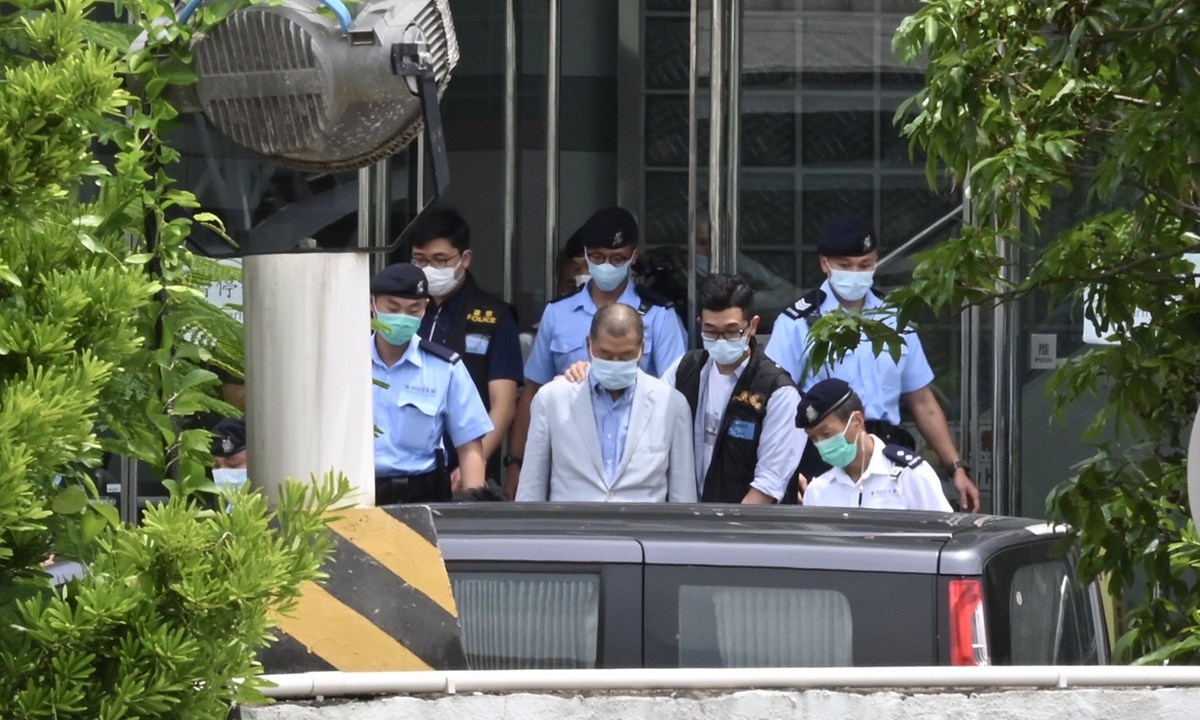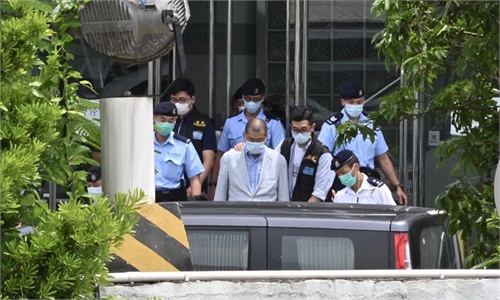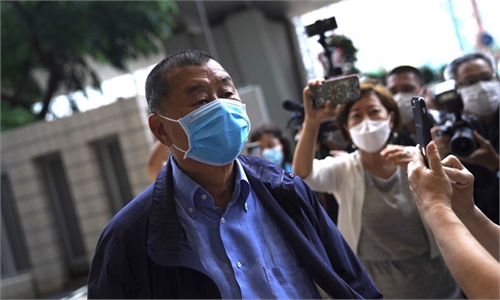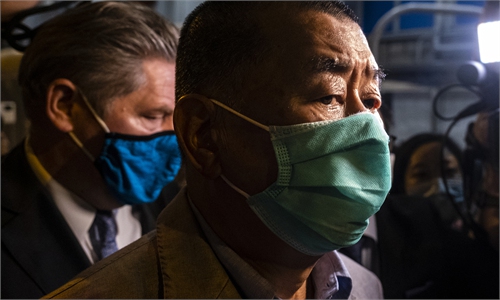
Hong Kong police officers escort media tycoon Jimmy Lai Chee-ying after his arrest on Monday. Photo: Xinhua
As expected, the US has responded fiercely to the Hong Kong police's arrest of Jimmy Lai Chee-ying. Vice President Mike Pence, Secretary of State Mike Pompeo, National Security Adviser Robert O'Brien and senators such as Marco Rubio lashed out. This was in stark contrast to Europe, as the European Commission spokesperson only expressed its routine stance over the matter.It shows that Lai's arrest has touched on US interests in Hong Kong and destroyed the channel through which Washington interferes in Hong Kong affairs.
Ideological differences exist between Europe and China, but the two sides have no serious geopolitical spats. However, both ideological and geopolitical conflicts shape China-US relations, and US geopolitical ambitions are the real driving force of the US' demented containment of China. Since the US cannot play geopolitics publicly, it ramps up ideological attacks on China to legitimize its hegemony using Western rhetoric.
Hong Kong affairs have nothing to do with freedom of the press. It is whether this highly autonomous city abides by the "one country, two systems" framework, or accepts Washington's manipulation and serves US strategies. Lee and his ilk want to be US pawns in Hong Kong and dedicated to turning Hong Kong into a pivot. They are special allies of the US.
As China-US strategic competition deepens and the US suppresses China in an ever hysterical manner, Lai has slipped into the shameful position of an accomplice of the US and become a genuine traitor.
China-US strategic contest will exert a fundamental influence on where we live. The close interaction between the Chinese people and the US may shift over changes in US objectives. People like Lai have no sense of this and hate the country from the bottom of his heart, but others must remain sober-minded and vigilant.
Some in the Hong Kong pan-democracy camp hope to pressure the central government by destabilizing Hong Kong. They're using it as a way to exercise democracy.
But they should know that destabilizing Hong Kong has become an important means for the US to contain China. If they continue to push Hong Kong into chaos and insist it's their "democratic rights," and if they accept US support and provide leverage and opportunities for the US to destabilize Hong Kong, they are choosing the wrong path.
Lai has gone too far on this path. He has fallen completely into the US orbit. His efforts not only aim at pushing Hong Kong society toward the US in terms of values, but also kidnapping Hong Kong interests to place Hong Kong on the US chariot--thus fundamentally turning Hong Kong, China's window to the outside world, into the US anti-China frontline.
Apart from Lai's own choice, the fundamental adjustment of the US' China strategy has enhanced his collusion with the US to endanger China's national security. In the end, the so-called freedom of the press became his playful tool with which he promotes US strategic interests in Hong Kong. Then he used US interference in Hong Kong affairs as a lever to protect himself, and attached his interests and safety to Washington's Hong Kong policy. This is how a traitor came into being.
Lai is destined to be spurned by Chinese history. He is a tragedy in which he, as a Chinese, picked the wrong side and walked on the wrong path. His argument over "freedom of the press" cannot offset his betrayal in key moments - he acted as an agent and led the way for US containment of China.
Hong Kong's press freedom has great room, and Lai's Next Digital is still operating. Why make it serve Washington's China offensive? Lai should explain that to history.
Helping Hong Kong stabilize is protecting Hong Kong and helping the Chinese nation amid the stormy China-US competition. Anyone who loves China and Hong Kong should make the moral choice at this critical historical juncture.



